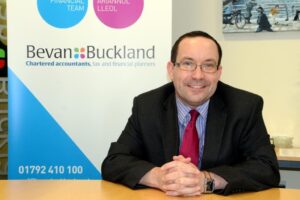Lee Bradley, Tax Director at Bevan Buckland LLP
Wales’ largest independent accountancy firm, Bevan Buckland LLP, has warned that buy-to-let landlords, second homeowners and those who have inherited a property they are not living in are being tripped up by unexpected penalties and interest on late paid tax.
A growing number of landlords are overlooking a new rule requiring capital gains tax on UK residential property to be reported and paid to HMRC within 30 days. The rule kicked in earlier this year, ushering in a change to tax rules affecting residential property owners which seeks to raise more tax from the disposal of additional homes and to collect this tax quicker.
Many buy-to-let landlords, second homeowners or accidental landlords are in the firing line when it comes to being a target of this tax change, which affect homeowners who make a gain on the disposal of additional residential property in 2020/21 – the 30-day rule requires this tax to be paid considerably earlier. Failure to do so can result in penalties and interest on any late-paid tax.
Lee Bradley, Tax Director at Bevan Buckland LLP, said: “We are seeing a number of buy-to-let landlords being affected by this change and facing unforeseen costs because of it. And at a time when there is a reported 22 percent increase in first-time buy-to-let landlords in Wales, thought to be prompted by the pandemic, this is going to be an issue for a growing number of people.
“For many of the 1.2 million disposals of residential property in the UK each year, there will be no capital gains tax liability because some individuals will qualify for private residence relief. This relief applies if the residential property is your home and it was solely used as your private residence during the entire time it was owned. However, many buy-to-let landlords, second homeowners or accidental landlords are in the firing line when it comes to being a target of this change. If you live in the UK, you might need to report and pay capital gains tax when you sell or otherwise dispose of: property you’ve not used as your main home, a holiday home, a property you have let out for people to live in or an inherited property you have not used as your main home.
“Should you make a gain on the disposal of additional residential property in 2020/21, the 30-day rule will require this tax to be paid much earlier. And this change doesn’t just affect the individual taxpayer. The same principles now also apply to trustees who sell or dispose of a UK residential property held within a trust.”
Before 6 April 2020, any capital gains tax owed was paid when filing your self-assessment tax return on or before 31 January following the end of the tax year in which the additional residential property was sold. This could be anywhere between 10 and 22 months after the sale had been completed. From 6 April 2020, anyone making a taxable gain from the sale of an additional UK residential property will have to pay the tax owed within 30 days of the completion date, by submitting an online capital gains tax disposal return.
Lee adds: “Bringing the payment of capital gains tax forward on such disposals to 30 days will give an estimated one-off additional yield to the Treasury of between £5 billion and £8bn, but it has added a layer of complexity for landlords, and they should seek advice from their accountant to help with this at the earliest opportunity, so they don’t risk incurring fines. It is possible to offset capital losses as part of the process and it is important to be aware that although you need to report disposals of property within 30 days, you still need to report the disposal on your annual self-assessment tax return.”
Bevan Buckland LLP has offices throughout South West Wales, and it is the largest independent accountancy practice in Wales providing accountancy services, tax compliance and advisory services and other strategic advice for small to medium-sized businesses. Headquartered in Swansea, the practice has offices in Carmarthen, Pembroke, Haverfordwest and St David’s.
For more information, please complete the form below or call us on 01792 410100.

